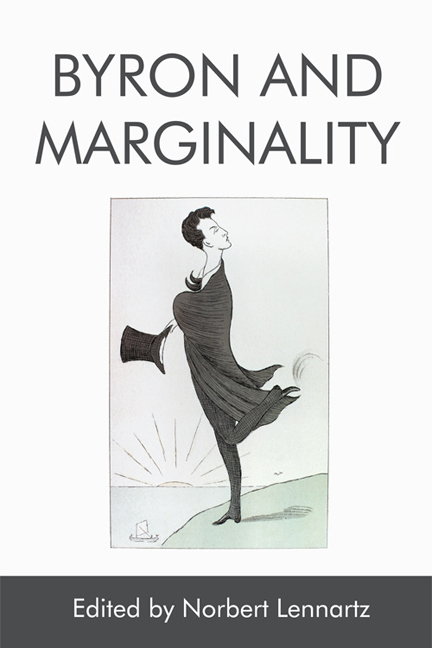Book contents
- Frontmatter
- Contents
- Foreword
- Acknowledgements
- Editions and Abbreviations
- 1 Lord Byron, Wandering and Wavering between the Centres and Margins of Romanticism: An Attempt at an Introduction
- I Byron’s Marginalisation in Romantic World Literature
- II Byron’s Marginal Identities and Places
- III Cherishing the Marginal – Marginal Genres in Byron
- IV On the Provocative Margins of Taste
- V Marginal Affairs – Visual and Paratextual Aspects in Byron
- List of Contributors
- Index
14 - A Margi nal Interest? Byron and the Fine Arts
Published online by Cambridge University Press: 06 May 2021
- Frontmatter
- Contents
- Foreword
- Acknowledgements
- Editions and Abbreviations
- 1 Lord Byron, Wandering and Wavering between the Centres and Margins of Romanticism: An Attempt at an Introduction
- I Byron’s Marginalisation in Romantic World Literature
- II Byron’s Marginal Identities and Places
- III Cherishing the Marginal – Marginal Genres in Byron
- IV On the Provocative Margins of Taste
- V Marginal Affairs – Visual and Paratextual Aspects in Byron
- List of Contributors
- Index
Summary
What is it about art that we find intellectually so elusive? Is it because it takes the form of colour, shape, and pattern in two or three dimensions, rather than words, themselves the instruments of reflection and analysis? Why is it that Keats is so right to say of his Grecian urn that it can ‘express / A flowery tale more sweetly than our rhyme’1: to suggest that art is a sweeter medium than literature? Is it because paintings make such an (apparently) immediate impact on our senses, in a rush and in one go, whereas literature is condemned to operate at one remove from the throne of truth by the ploddingly sequential and syntactic medium it exploits (that it ‘pours ideas into our minds’, as Jonathan Richardson wrote in his The Theory of Painting in 1715, whereas ‘words only drop them. The whole scene opens at one view, whereas the other way lifts up the curtain by little and little’2)? What are the varying relations between form and content in the two forms of creative communication? Perhaps an amateur of genius, like Lord Byron, can shed some light on these perplexing questions.
Byron's indifference to painting is well attested to, not least by himself. Three examples are representative. On 6 March 1814, he wrote to Thomas Phillips, who had painted no fewer than three portraits of the poet in recent months:
Dear Sir/ – I regret troubling you – but my friend H[obhouse] who saw the pictures today suggests to me that the nose of the smaller portrait is too much turned up – if you recollect I thought so too – but as one never can tell the truth of one's own features – I should have said no more on the subject but for this remark of a friend whom I have known so long that he must at least be aware of the length of that nose by which I am so easily led. – Perhaps you will have the goodness to retouch it – as it is a feature of some importance […]. (BLJ, vol. 4, p. 79)
In the same year, John Knowles recorded a conversation between Byron and the Swiss artist, Henry Fuseli:
‘I have been looking in vain, Mr. Fuseli, for some months, in the poets and historians of Italy, for the subject of your picture of Ezzelin: pray where is it to be found?’
- Type
- Chapter
- Information
- Byron and Marginality , pp. 271 - 290Publisher: Edinburgh University PressPrint publication year: 2018

